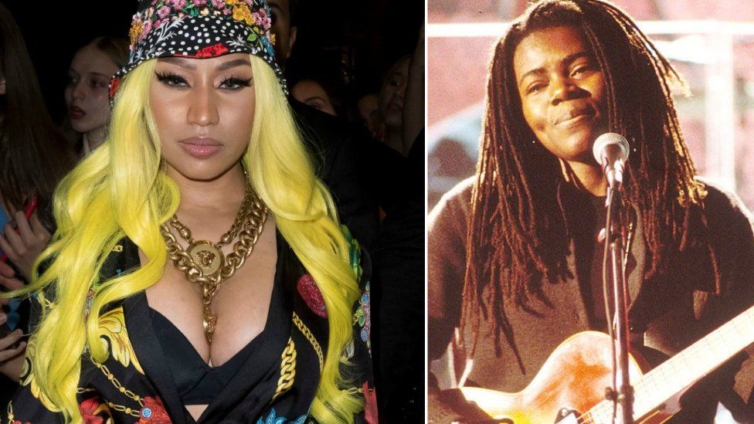Rapper Nicki Minaj will pay singer Tracy Chapman $450,000 (£332,000) to settle a copyright dispute after sampling one of her songs.
Chapman sued Minaj in 2018, saying she had used portions of Baby, Can I Hold You Tonight in her song Sorry.
Although the song was never released, a leaked version made its way to radio DJ Funkmaster Flex and went viral online.
Nicki Minaj settles her copyright case with Tracy Chapman by paying $450,000. https://t.co/UFn1S4VrJP
— BBC News Entertainment (@BBCNewsEnts) January 8, 2021
Chapman accused Minaj of sharing the song with Flex, although both have denied that version of events.
Minaj wrote Sorry with fellow rapper Nas while recording her fourth album Queen in 2018.
It was based on a sample of the dancehall track Sorry by Jamaican artist Shelly Thunder. Unbeknownst to Minaj, that song was based on Baby, Can I Hold You Tonight, from Chapman's Grammy-winning 1988 debut album.
After discovering the connection, Minaj and her record label sought permission to use Chapman's composition, but the singer-songwriter repeatedly refused.
The singer's lawyer said she has a blanket policy against granting such permission. One of the clearance specialists working for Minaj was also said to have known Chapman was on an unofficial "do not sample" list.
In an earlier judgement, US District Judge Virginia A Phillips ruled that Minaj's experimentation with Chapman's song in the studio constituted "fair use".
In doing so, she sided with the rapper's lawyers, who argued that artists need to be free to sample music while writing and recording, without worrying about being sued once they approach the rights-holder for a licence.
"Such free-flowing creativity is important to all recording artists, but particularly in hip-hop," Minaj's team argued.
"With that category of music, a recording artist typically goes into the studio and experiments with dozens of different 'beats' or snippets of melodies, before hitting upon a pleasing combination."
Judge Phillips agreed that "a ruling uprooting these common practices would limit creativity and stifle innovation within the music industry".
She added that there was "no evidence" that Minaj's song "usurps any potential market for Chapman" and her original song, a searingly personal guitar ballad.
However, the judge set up a trial to explore how Sorry came to be leaked and distributed, and whether that constituted copyright infringement.
That trial will no longer take place after Chapman accepted Minaj's offer. The settlement includes Chapman's costs and legal fees to date, according to documents made public by the California Central District Court.
Latest Stories
-
Embrace ICT to fit in digital world – Ho NYA boss to youth
27 mins -
We don’t want armed soldiers at polling stations – Tanko-Computer
30 mins -
Drama as police corner armed robbers inside locked forex bureau at Lapaz
41 mins -
Nigerian-born conquers childhood hearing loss to become KNUST’s overall best graduating student
1 hour -
ECOWAS Court orders compensation for violations against New Force’s Shalimar Abbiusi
1 hour -
Dreams FC denies allegations of attempting to sign Najeeb Yakubu
2 hours -
Election 2024: ‘Right to free and fair elections non-negotiable’ – Akufo-Addo
2 hours -
Kurt Okraku took out my passport from the U23 squad that travelled to Japan – Najeeb Yakubu alleges
3 hours -
Where hope fails: Ghana’s decaying home for the destitute
3 hours -
NDC Mining Committee for 2024 campaign refutes allegations of recruiting thugs for elections
3 hours -
Traction Control: A lifesaver with an off switch? Here’s why it exists
3 hours -
I don’t need anyman to woo me with money – Miss Malaika 2024 winner refutes pimping claims
3 hours -
”Kurt Okraku sabotaged my national team career because I refused to sign with Dreams FC” – Najeeb Yakubu
3 hours -
Businesses urged to leverage Generative AI for enhanced customer engagement
3 hours -
MultiChoice Ghana partners with Ghana Hotels Association to elevate guest entertainment
3 hours

